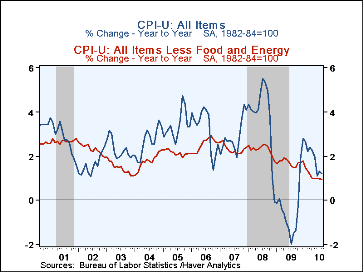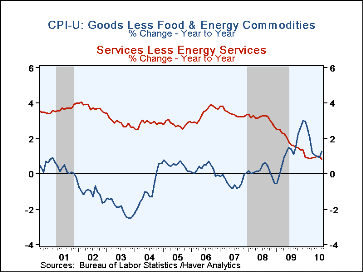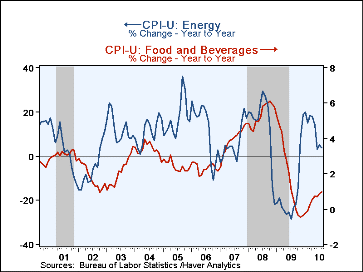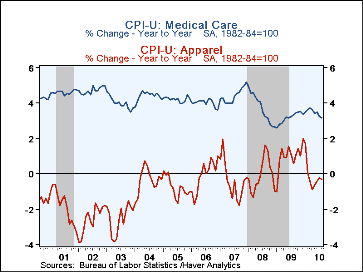 Global| Sep 17 2010
Global| Sep 17 2010CPI Steady But Core Prices Decelerate
by:Tom Moeller
|in:Economy in Brief
Summary
Higher prices for energy products continued to lift overall consumer price inflation. A 0.3% increase in the August CPI (1.2% y/y) repeated the July performance. That news, however, is where the story of any strength in U.S. pricing [...]
Higher prices for energy products continued to lift overall consumer price inflation. A 0.3% increase in the August CPI (1.2% y/y) repeated the July performance. That news, however, is where the story of any strength in U.S. pricing power ends. First, the last two increases followed three consecutive months of slight decline. Second, price gains excluding food & energy continued tame and decelerating ever-so-slightly(Fine print to come). During the first eight months of this year prices rose at a 0.6% annual rate and the August figure matched Consensus expectations.
Energy prices were one of the only areas of pricing strength last month. Their 2.3% m/m increase roughly matched the July gain and raised prices 3.8% from last year. Gasoline prices jumped another 3.9% (4.4% y/y) and roughly matched the July increase, Natural gas & electricity prices rose 0.4% (2.2% y/y) and fuel oil prices (NSA) rose 0.7% (10.8% y/y). Food & beverage prices rose for the first month in the last four. Fruit & vegetable prices were the firmest posting a 0.4% increase (-0.5% y/y). Elsewhere, many prices fell. Prices for meats, poultry, fish & eggs reversed their July gain with a 0.3% decline (+2.9% y/y) while dairy prices slipped 0.1% (+3.3% y/y). On the other hand, the cost of eating out got more expensive, showing a 0.3% increase (1.2% y/y) which was the strongest monthly gain since April of last year.
Core consumer pricing power continued muted. Excluding food & energy, prices were unchanged leaving the y/y gain stable near its low of 1.0%. But here's where reading the fine print paints a picture of more deceleration. Splitting hairs, out to two decimal places, the y/y gain of 0.95% was the lowest since February 1961. A 0.1% August uptick had been expected. Year-to-date prices rose at an even slower 0.69% annual rate. Core goods prices rose 0.1% m/m and at a 0.4% annual rate so far in 2010. Pricing strength again was led by a 0.4% increase (7.7% y/y) in tobacco prices. New and used motor vehicle prices also rose 0.4% (4.9% y/y). Prices of home furnishings & operation were unchanged (-2.6% y/y) while apparel prices slipped 0.1% (-0.3% y/y).
Core services prices were unchanged (0.8% y/y), the weakest month since January. Medical care was the only area of increase and the 0.2% gain pulled prices up 3.2% y/y. Education costs were unchanged (4.3% y/y). Shelter costs slipped marginally m/m (-0.5% y/y) as owners equivalent rent of primary residences, a measure not equivalent to other house price measures, was unchanged (-0.3% y/y). The y/y decline in this measure was the weakest reading since the series' start in 1983. Public transportation costs slipped 0.2% (+6.6% y/y).
The chained CPI, which adjusts for shifts in consumption patterns, ticked up 0.1% and rose 0.9% year-to-year. Chained prices less food & energy also ticked 0.1% higher and were up only 0.6% y/y.
The consumer price data is available in Haver's USECON database while detailed figures can be found in the CPIDATA database.
| Consumer Price Index (%) | August | July | June | August Y/Y | 2009 | 2008 | 2007 |
|---|---|---|---|---|---|---|---|
| Total | 0.3 | 0.3 | -0.1 | 1.2 | -0.3 | 3.8 | 2.9 |
| Total less Food & Energy | 0.0 | 0.1 | 0.2 | 1.0 | 1.7 | 2.3 | 2.3 |
| Goods less Food & Energy | 0.1 | 0.2 | 0.2 | 1.3 | 1.3 | 0.1 | -0.4 |
| Services less Energy | 0.0 | 0.1 | 0.1 | 0.8 | 1.9 | 3.1 | 3.4 |
| Energy | 2.3 | 2.6 | -2.9 | 3.8 | -18.1 | 13.7 | 5.6 |
| Food & Beverages | 0.1 | -0.0 | -0.0 | 1.0 | 1.9 | 5.4 | 3.9 |
| Chained CPI: Total (NSA) | 0.1 | -0.0 | -0.2 | 0.9 | -0.1 | 3.7 | 2.5 |
| Total less Food & Energy | 0.1 | -0.0 | 0.0 | 0.6 | 1.5 | 2.0 | 1.9 |
Tom Moeller
AuthorMore in Author Profile »Prior to joining Haver Analytics in 2000, Mr. Moeller worked as the Economist at Chancellor Capital Management from 1985 to 1999. There, he developed comprehensive economic forecasts and interpreted economic data for equity and fixed income portfolio managers. Also at Chancellor, Mr. Moeller worked as an equity analyst and was responsible for researching and rating companies in the economically sensitive automobile and housing industries for investment in Chancellor’s equity portfolio. Prior to joining Chancellor, Mr. Moeller was an Economist at Citibank from 1979 to 1984. He also analyzed pricing behavior in the metals industry for the Council on Wage and Price Stability in Washington, D.C. In 1999, Mr. Moeller received the award for most accurate forecast from the Forecasters' Club of New York. From 1990 to 1992 he was President of the New York Association for Business Economists. Mr. Moeller earned an M.B.A. in Finance from Fordham University, where he graduated in 1987. He holds a Bachelor of Arts in Economics from George Washington University.










